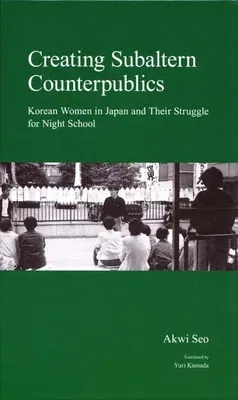Akwi Seo
(Author)Creating Subaltern Counterpublics: Korean Women in Japan and Their Struggle for Night SchoolHardcover, 17 April 2017

Qty
1
Turbo
Ships in 2 - 3 days
In Stock
Free Delivery
Cash on Delivery
15 Days
Free Returns
Secure Checkout

Part of Series
Japanese Society
Print Length
272 pages
Language
English
Publisher
Trans Pacific Press
Date Published
17 Apr 2017
ISBN-10
1925608913
ISBN-13
9781925608915
Description
Product Details
Author:
Book Format:
Hardcover
Country of Origin:
US
Date Published:
17 April 2017
Dimensions:
21.59 x
13.72 x
2.29 cm
ISBN-10:
1925608913
ISBN-13:
9781925608915
Language:
English
Pages:
272
Publisher:
Series:
Weight:
498.95 gm